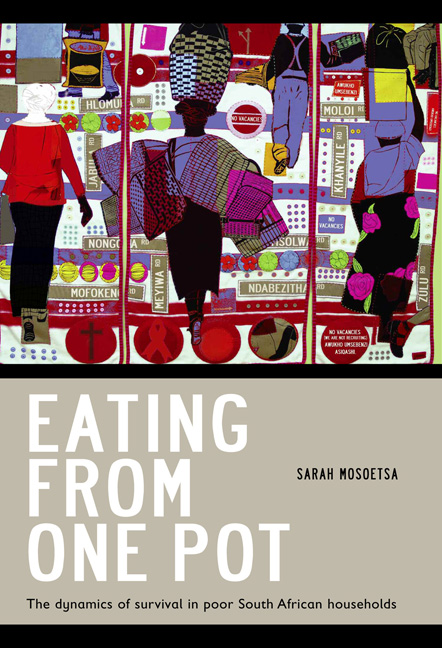Book contents
- Frontmatter
- Contents
- Foreword
- Acknowledgements
- Introduction
- Chapter 1 ‘Sharing the little I have with my family’: the allocative rules of household resources and income
- Chapter 2 ‘My wife does not respect me anymore’: unequal power dynamics in households
- Chapter 3 ‘I remain an ANC member, but …’: civil society in Mpumalanga and Enhlalakahle
- Chapter 4 Theoretical and Policy Implications
- Conclusion: Poor households are fragile sites of stability
- Selected Bibliography
- Index
Chapter 4 - Theoretical and Policy Implications
Published online by Cambridge University Press: 20 April 2018
- Frontmatter
- Contents
- Foreword
- Acknowledgements
- Introduction
- Chapter 1 ‘Sharing the little I have with my family’: the allocative rules of household resources and income
- Chapter 2 ‘My wife does not respect me anymore’: unequal power dynamics in households
- Chapter 3 ‘I remain an ANC member, but …’: civil society in Mpumalanga and Enhlalakahle
- Chapter 4 Theoretical and Policy Implications
- Conclusion: Poor households are fragile sites of stability
- Selected Bibliography
- Index
Summary
The post-apartheid South African state has had mixed success in achieving its goals of economic and social transformation in the country. As the case studies in this book show, well intended social and economic policy changes have had only a limited impact on poor households. If anything the situation in most households has deteriorated. Women, children and the elderly have been the worst affected. This chapter discusses the persistence of household poverty in the light of the theoretical and policy implications of the evidence that is presented in the rest of the book. In particular, it analyses the survival of households and communities by engaging critically with the livelihoods approach and the livelihood frameworks that the livelihoods approach has inspired.
The chapter is critical of the sort of livelihoods framework that turns solely on the notion of ‘social capital’ or assets. At the same time, though, it deploys a more complex version of the livelihoods approach, one which focuses on the material, social and political survival activities of the poor. The socio-political and economic focus of such an approach, I would argue, offers a holistic conceptual framework for understanding how poor urban households and communities survive at the same time as it avoids falling into the trap of being overly economistic. I follow an analytical approach that emphasises the ways in which people make use of the social and political resources at their disposal in order to explain the existence of dynamic societal relations both within and outside the household. It is these relations that afford household members agency. Central to the analysis and methodology of both the field studies in this book and the analysis that is presented in this chapter, therefore, is a relational approach that pays particular attention to how people employ their resources as well as to the ways in which the power dynamics that exist both inside and outside the household serve to facilitate or constrain the exercise of agency.
This sort of broad livelihoods approach offers a holistic understanding of both household and community livelihoods. It links these livelihoods to the broader social, political and economic context, at local, provincial, national and international level.
- Type
- Chapter
- Information
- Eating from One PotThe dynamics of survival in poor South African households, pp. 115 - 146Publisher: Wits University PressPrint publication year: 2011



